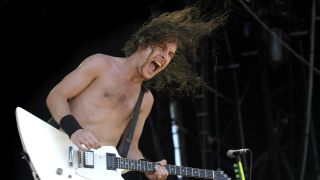With a Classic Rock award under their belts, Adelaide’s finest, TRACER, are making waves over here. If only they could say the same at home…
When Tracer frontman Michael Brown stepped onto a plane at Heathrow last November, his eyes still flickering from the chorus of paparazzi flashbulbs that blinded him at the previous night’s Classic Rock Awards, all that separated the guitarist/vocalist from his native Adelaide were 10,000 miles, a few in-flight movies and the odd bag of complimentary peanuts. But while Tracer may have undertaken that journey with the Best New Band gong under their belts, and the satisfaction of having just completed their first ever headlining tour of Europe and the UK, their reception upon arriving in Australia couldn’t have been quieter had the plane diverted and landed on Mars.
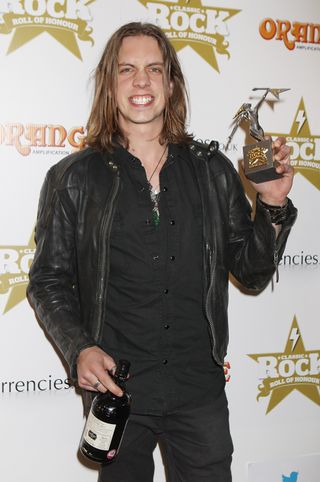
“We’ve given up on Australia for the last five years,” shrugs Brown today, having just knocked off from his part-time job as a landscape gardener. “You’ve got one radio station that controls all the new music, and it’s turned into a trend station rather than a talent station, filled with indie, hip-hop and electronica. And the more commercial music festivals have just become a fucking fashion parade. It’s ridiculous.”
If there’s one thing Tracer are not, it’s fashionable. In an age where “guitar rock” has come to mean anodyne 80s-flavoured indie fare (with the fashion sense to match), the Adelaide three-piece favour dirt over beauty, distortion over subtlety and tinnitus over timidness. A classic power trio in every sense of the word, theirs is a sound that merges the desert rumble of Kyuss with the epic scope of Zeppelin, topped with a hint of grunge’s malevolence.
You’d think a country renowned for its hard-drinking, hard-rocking history would embrace them, but things are different Down Under these days. Homegrown hip-hop and electronica artists battle for airtime and chart space with singer-songwriters and interestingly dressed hipsters, effectively pushing no-bullshit rock’n’roll underground. Even the nation’s sweaty pubs, for so long an incubator for bands, are a dwindling species. And while local scenes are thriving in the cracks, what it means for a band like Tracer is that outside of Adelaide, you’d be hard pressed to find too many people in the country who’ve even heard of them.
“We don’t tour here ’cos we can’t get the funds,” says Brown, who when singing unleashes a roar not dissimilar to Chris Cornell’s, yet in conversation makes for jovial, plain-spoken company. “It isn’t really a possibility at the moment. It’s really difficult when you can pack out London but come back to your home town and can’t really describe how well it’s going overseas ’cos there’s nothing here for people to see.”
If this sounds like the self-indulgent moaning of a spoilt rock star, it’s worth noting that the 27-year-old Brown has devoted his life to music since he picked up a guitar at the age of six. The son of a postman and a university worker, Brown started taking guitar lessons at the age of 10. Within a year, he and his young sibling Leigh had formed The Brown Brothers, a blues outfit whose acclaim was such that their dad would drive them to gigs in Brisbane, some 1,300 miles away. Then, when he turned 15, Brown encountered Nirvana, Led Zeppelin and Metallica. “Suddenly it was like, I can turn my guitar up that loud and be obnoxious and people love it?” he recalls. “That’s awesome!”
Shortly afterwards, Brown put together Tracer with his brother Leigh on bass and schoolmate Andre Wise on drums. Success in their home town came early and easily, but by 2007 the trio were at a crossroads. Playing to their mates in Adelaide was hardly a stepping stone to breakthrough success, a situation not aided by the city’s distance from the larger population centres of the country’s east coast.
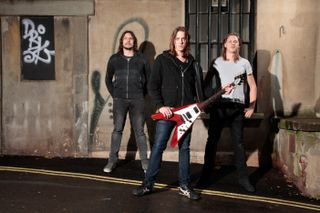
They knew they’d either have to move 500 miles to the more bustling music scene of Melbourne, or pool their funds and try their luck overseas. With each member chipping in $20,000 (around £14,000) – a combination of their life savings and the money they’d earned playing covers on the side – they chose the latter and set off on a self-funded four-and-a-half-month European tour. For the first two months they slept in the back of their van – until, that is, it broke down in Amsterdam, necessitating a wallet-busting flight to London for a UK tour, half of which got cancelled. Things didn’t improve in Wales. “I slept on a wet floor in this guy’s house with nothing but a smelly rug to keep me warm,” Brown winces. “All I could think of was bugs crawling in my ears.”
Five European tours later and circumstances in the UK and on the continent have improved somewhat. Their debut album, 2011’s _Spaces In _Between, drew kudos from Nikki Sixx and Alice Cooper, and though the shadow of AC/DC looms large over their every move – in-house sound guys at each venue apparently insist on playing the Australian giants before Tracer walk onstage – the trio are drawing bigger crowds with each return visit.
The next step in their crusade for the big leagues came late last year when Tracer decamped to LA to record their second album, El Pistolero, with Black Country Communion/Iron Maiden producer Kevin Shirley. In less than two weeks they worked up 14 songs, some of which follow a concept based on Robert Rodriguez’s 1995 thriller, Desperado.
“It’s a cool story and I thought maybe I should write some songs around it, give the music a south-of-the-border, Mexican feel,” says Brown. “That sound is already kind of relevant in our music anyway, so let’s just push it a bit further.”
The gulf between their high-flying experiences in LA and the life the band lead back home is huge. Brown still lives with his parents and the trio are, says the singer, completely broke, with debts stretching back to that first European tour. The struggle got too much for Brown’s brother, Leigh – he left the band last year, to be replaced by fellow Adelaide native Jett Heysen-Hicks.
“Mum always says, ‘If you get a proper job, you don’t have to go through all this shit, you don’t have to eat baked beans for breakfast, lunch and dinner,’” says Brown with a laugh. “But we feel comfortable on the road. We’re not sleeping in fantastic hotels, and we’re not eating great, but there’s this machine at work and it always feels like you’re getting somewhere. And because you’re doing what you love every night, there’s that pay-off every single day. There needs to be some kind of revolution where people finally say, ‘Fuck all this other shit, we want to hear a band again.’ And that’s what we’re trying to do.”
AIRBOURNE
The death-defying, beer can-smashing junior AC/DC finally grow up. Well, sort of…
In the annals of rock history, somewhere after the chapter on bat decapitation and red snapper insertions, you might just find a tiny footnote detailing the events that took place at the Download Festival on June 13, 2010.
It was late afternoon when Airbourne singer Joel O’Keeffe was led offstage by a team of security wardens who’d just cut the power to his band’s set due to an unforeseen crime against common sense.
But while it could be argued that climbing to the top of a 50-foot steel stage enclosure under heavy rain with a guitar slung over his back in order to complete the solo from the title track to their 2007 debut album Runnin’ Wild displayed a potentially fatal ignorance of meteorological inevitability, as far as entertainment goes, it was hard to beat.
Spend a little time with the stocky denim- and leather-clad frontman and his drummer brother Ryan – arguably the more settled, sensible of the pair but just barely – and you get a sense that the duo didn’t lose any sleep over it. Right now they’re downing beers at an admirable pace in the back of an aromatic central London pub that’s seen better days. It may be rundown, but for a band that’s made muscular, no-bullshit, spit ’n’ sawdust rock their mission in life, anywhere else would seem a touch too much.
“Yeah mate, we got in a little trouble there, didn’t we?” says Joel, grinning devilishly. “That‘s the point, isn’t it?”
It could be argued that the hairiest export ever to have stumbled drunkenly out of the small backwater town of Warrnambool have turned not giving a shit into a Lebowskian mod d’être. Sometimes dismissed as a derivative echo of AC/DC – or more accurately Rose Tattoo – Airbourne exhibit a Zen-like indifference to criticism and passing trends.
But if you think there’s nothing more to these Aussie shitkickers than taking performance cues from rabid monkeys and crafting the kind of fist-in-the-air, mid-tempo stomps that make comparisons to the gods of our world inevitable, guess again.
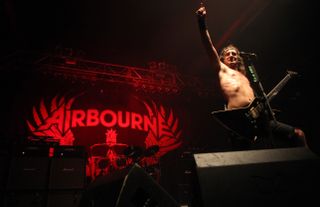
More than fans, Airbourne’s knowledge of their forebears is exquisite. Name a classic, they’ll tell you where the B-side begins. Cite an album cover and they’ll describe it in infinite detail. It makes the voice of their critics seem crass: they aren’t unthinking copyists, but torch-bearers for a new generation, desert-blasted seekers of the holy grail. Theirs is a fanatical love, and it’s impressive – almost scary. Do you know any bands that hop from studio to studio to hear unmixed master reels to discover the hidden knowledge? You do now.
“The thing about engineers is, you never know what they’ve got,” says Ryan. “We knew this one guy, he actually had the multi-tracks of Rock Of Ages, Pour Some Sugar On Me, Bohemian Rhapsody and Stayin’ Alive. Oh man! You can hear everything.”
But if there’s one man who acts as a lodestone for everything they love about the sound of rock’n’roll, it’s Mutt Lange, the Midas-like producer who turned Def Leppard, The Cars and, of course, AC/DC into superstars. You can hear the spirit of Lange in Airbourne’s fourth album, Black Dog Barking. It’s an anthem-laden cannonblast of a record, and one they profess is the distillation of everything they’ve ever wanted to achieve as artists thanks to a new studio technique of their own creation.
“We call the process, ‘muttanation’,” says Joel. “M-U-T-T…”
What?
“Muttanation,” he explains. “It’s our word for our favourite production techniques. We got it from Mutt Lange, but it includes everything we love about great records.”
As Ryan explains, the recent closure of long-time label Roadrunner Records left the foursome uncertain about their future. Faced with the unsettling prospect of having to produce the record themselves, the brothers sat down to create a diagram of every rock band that matters, how they got their sound, and the producers who made it possible, from Zeppelin to Def Leppard to Bad Company… and the list goes on.
“What we ended up with was this huge chart of all the little things producers do to make their albums rock,” explains Ryan. “It took us, like, two years to make. You could call it OCD.”
Or maybe OC/DC. But then spend any time with Airbourne’s fraternal founders and it’s obvious why they’re so beloved – their wide-eyed affability and their unwavering adoration of their predecessors is as infectious as the songs they’re known for, but there’s something else, too. Beneath their dropped-in-infancy barminess is a nearly obsessive quest to find their footing in the pantheon, coupled with a maniacal desire to pay their dues.
Born too late to stand shoulder-to-shoulder with their heroes, and too far away from a major city to benefit from anything approaching a local scene, theirs has been a long ascent – one that began early.
“When we were kids we had a world map and an Australia map on my wall,” says Ryan. “We saw it like a war. As an Australian band you feel like you’re on the other side of the world in all kinds of ways, and Australia really teaches you that if you’re gonna play that loud and upset my beer, you’d better fucking impress me.”
It’s a lesson that Airbourne have taken on board, and then some. From perfecting their now trademark mid-set stage climb by rehearsing it endlessly in their home – to their neighbours’ dismay – to insisting that they only gigged with massive speaker stacks “because that’s what Metallica do”, the O’Keefes are dedicated to the cause of entertainment. And then there’s Joel’s party trick of smashing a beer can over his own head while singing. Which begs the question, how the hell do you discover you can do that?
“I used to do it on my wrist,” he says, “until I hit the bone too hard and split it wide open. There was blood everywhere. Now I just use me head.”
He blinks and smiles, taking a deep swig of his beer. A beat passes, then two. To the brothers, this is obvious, normal conduct, and any disbelief says more about you than it does them. Like their music, it seems best to just accept all it as part of the charm, and nod our heads in time.
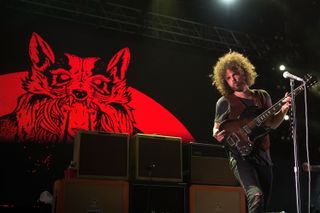
ANDREW STOCKDALE
Ex-Wolfmother man goes solo. The name has changed, but the songs remain the same
Wolfmother are dead. The livewire Australian band who put out two albums of psychedelic-tinged, freewheeling retro rock’n’roll are no more, according to the band’s mainman Andrew Stockdale.
Their line-up was always, well, fluid. Original bassist Chris Ross and drummer Myles Heskett quit after the band’s self-titled debut, leaving Stockdale to record follow-up Cosmic Egg with new personnel. But despite the success of the latter album – Top 40 in the UK, Top 20 in the US – the band lost more members during the recording of album number three, to the point where Stockdale is now starting over under his own name.
“I’m no longer booking any future shows or calling recordings by the Wolfmother name,” says Stockdale. “I want the freedom to be who I am. Now I’m just saying my name is Andrew Stockdale and that’s what’s gonna be on the album, posters, whatever. I’m just being straight up.”
What was slated to be the third Wolfmother album, Keep Moving, will now be Stockdale’s first under his own name. “It was time to call it what it is. When I pitch it to people, I say, ‘Would you like to be less famous, make less money and sell less records?‘ Generally it’s not the best way to pitch yourself to the music industry, but ethically this is the right thing to do.”
The only other remaining Wolfmother member on the album is bassist/keyboardist Ian Peres, and given Stockdale’s position as the band’s major creative force, Keep Moving isn’t a radical departure.
“I’m taking a bit of what I like from the past, spray-painting it, doing my thing with it and then making it my own. When the recording’s done within two hours with three mics on the kit, a different bassist and drummer, if it’s better then so be it. This is why I’m a solo artist now – my loyalty is to making music, not necessarily who’s playing it.”
THUNDER FROM DOWN UNDER!
It’s not all barbies and neighbours – meet the new Wave of Australian Rock…
ELECTRIC MARY
An oasis of classic rock in the hipster enclave of their native Melbourne, Electric Mary’s old-school racket references everything from GN’R to Free to mid-70s Deep Purple. They’ve already received the musical equivalent of a papal blessing from the likes of David Coverdale and Little Steven Van Zandt. 2011’s III is the best place to start.
THE DELTA RIGGS
A shit-kicking, barnstorming live act who combine the spirit of 60s Oz rock gods The Easybeats with the blues stomp of classic Rolling Stones. Singer Elliott Hammond previously played keys in a late incarnation of Wolfmother, though he’s better off with these reprobates – their just-released debut LP, Hex.Lover.Killer, is a cracker.
KING CANNONS
Formed in New Zealand but based in Melbourne, the sextet owe a debt to 50s rock’n’roll and the working-man swagger of The Clash. Tattooed frontman Luke Yeoward comes off like a cross between Joe Strummer and James Dean, peppering the band’s impressive 2012 debut, The Brightest Light, with tales of small-town escape.
THE GROWL
A Perth six-piece who sound like The Black Keys’ more deranged cousins via a bluesy, junkyard din with added fuzz. Their debut album, What Would Christ Do??, is generating good notices, while they were hand-picked by breakout Aussie psych-rockers Tame Impala to support them on their recent US tour. The fact that The Growl vocalist Cameron Avery also plays in Pond, which features members of Tame Impala, might have helped there.
ROYAL HEADACHE
The wildcards of the current wave of Australian rock bands. One of the more unusual live acts – each member looks like they belong in a different group – they’re also one of the most exciting. The Sydney quartet’s self-titled 2011 debut LP is bursting with abrasive but addictive blasts of rock’n’roll. Think a soul band being manhandled by a garage rock outfit and you’re nearly there.
REDCOATS
Nine Inch Nails/The Mars Volta producer Dave Schiffman worked on this Melbourne quartet’s 2012 self-titled debut album, but don’t expect electronic battery or epic prog wigouts. Instead, Redcoats channel fuzzy, stoner-ific slices of grunge-tinged psych-rock, albeit with a hippie flavour – the song Mean Money is a tribute to mother nature. “It sounds like you pressed your head against the speaker box,” says guitarist Neil Wilkinson of the album.
This article originally appeared in Classic Rock #184.
To find out what Joel from Airbourne made of Judas Priest’s Sydney show, then click on the link below.
